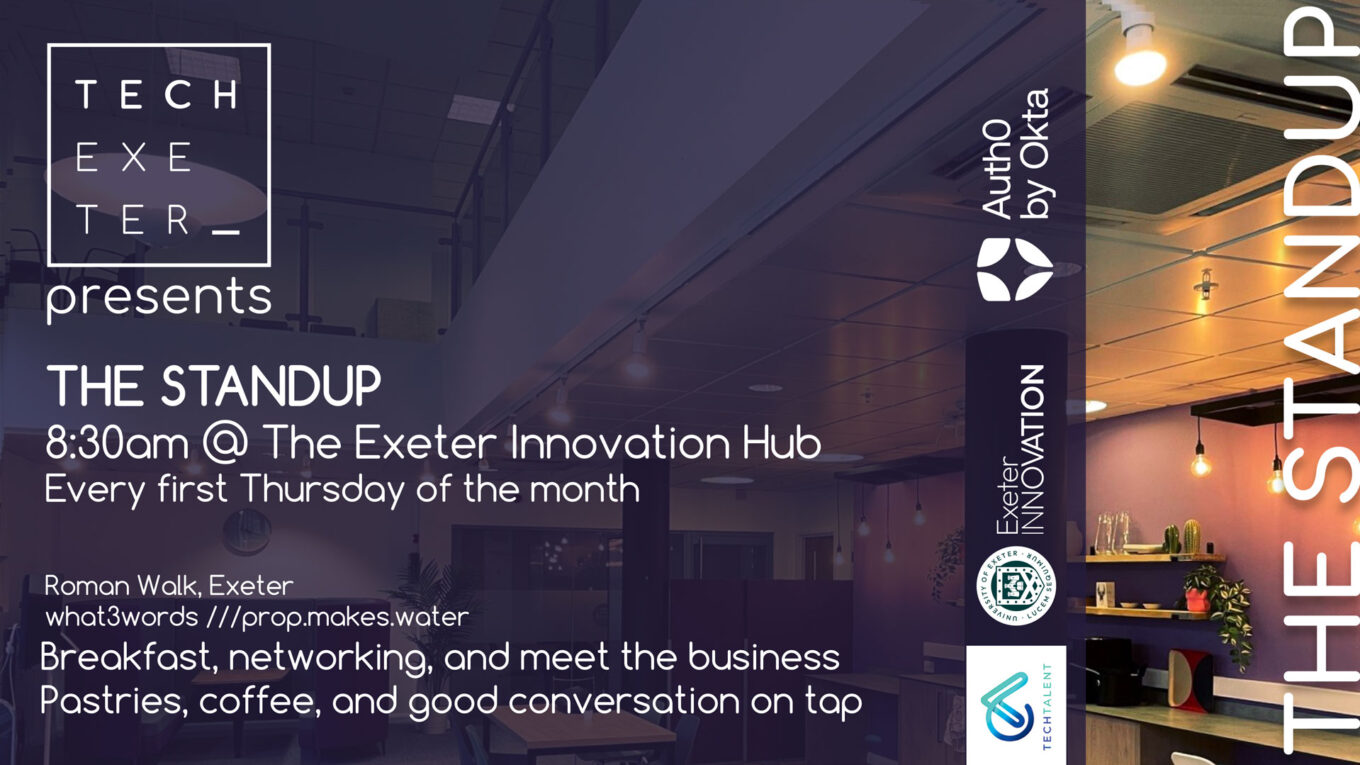Diversity isn’t easy, but it’s worth the effort
Following Kris’s comments on the debate about the lack of diversity at the Bristech conference, I felt inspired to post to the website for the first time since Jacob and I joined Kris as leaders of the community.
Many of you will already know that TechExeter is entirely volunteer-led, and with a demanding full-time job, an old thatch cottage to renovate, and the challenge of fitting everything we’re expected to do into one life these days, taking on the responsibility of helping to lead a vibrant, active community (with amazing events like GAME>PLAY and the conference to organise) has been a big commitment. I love the community and getting involved, but there was one very clear reason that drove me to get involved, and that was my passion for improving diversity in tech.
I’ve spent pretty much my entire career in tech innovation, mostly in the financial services, so as you can imagine diversity is a common challenge. I’ve been to fintech conferences where companies thought scantily clad ‘booth-babes’ dressed as policewomen were appropriate for a security app, or drafted in models in tight-fitting t-shirts to give their presentations for them. I spent nearly three years in Silicon Valley, a region which leads the way not only in innovation, but also in discrimination and terrible representation, especially of black and hispanic women. I then took a year out to travel around the world researching Innovation Ecosystems in emerging markets. I interviewed over 200 people – startup founders, accelerator programmes, government groups, venture capitalists, and anyone else involved with entrepreneurship – and one of my main lines of questioning was around diversity and representation in the local ecosystem. The conversations I had could be startling, and a little depressing. I think the ones that stick with me most are when someone would immediately fall back to a defensive rant about how much they love women, and how they have a wife and daughters, when all I’d asked was a general question about how diverse the ecosystem was.
As my career has gone on, I’ve becoming ever more passionate about advocating diversity in all industries, especially tech. And this isn’t just about fairness and equal rights, it’s also practical recognition that diversity is valuable and helps build more innovative, more sustainable businesses, which are able to spot their own mistakes and appeal to broader markets.
I could go on for a long time about what diversity means to me, and about how deeply sad the continued under-representation of particular groups makes me, but I guess my point is just to illustrate that diversity is absolutely a core driver for me, in all that I do. And yet, it is still so so hard to achieve.
So I have sympathy for the organisers of Bristech, I really do. It is damn hard, when you have a whole huge conference to pull together with minimal support and a shoestring budget, and you’re trying to balance quality, variety, open access, fairness etc etc, to also keep diversity in mind. It’s also damn hard when you desperately want to have diverse representation, but those elusive diverse people just aren’t putting themselves forward! In my day job I manage a team of data scientists, and every time a role opens up I hope for more female applicants, and I try to publish the role in more locations, and I check the wording in a gender-bias tool, but still I can usually still number the female applicants with only a couple of binary digits. Diversity is hard.
And why is diversity so hard? It is because, as Nic from Bistech points out, the industry has a diversity problem. I’m not sure why Nic chose to use Silicon Valley’s numbers, when Tech Nation do a great job of surveying the UK for our own figures – which currently find that 22% of tech directors are women and 19% of tech workers are women (despite women accounting for 49% of the general workforce). So clearly if we put out an open call for speakers, we’ve got to expect similar submissions…
But wait, isn’t this a bit of a Catch-22? We can’t have diverse representation because the industry isn’t diverse, but without diverse representation the industry won’t be diverse, so we can’t have diverse representation…. Because look, the fundamental point is that we won’t attract diverse involvement in the industry if we don’t show diversity in the industry. If we keep showing the industry as it is today, then why on earth would we ever expect it to change? We have to work damn hard (there’s that phrase again) to show the industry as we want it to be. Why is that? Because people want to be where they belong, it’s simple human nature!
I do sympathise with the straight white men who are being forced of late to recognise a problem that is very difficult for them to see, because it doesn’t affect them. If, when you walk into a room, it is always well-stocked with people who look and sound like you, then there’s no reason for you to know just how uncomfortable it feels to walk into a room where you are the odd one out. If you are a SWM and you still struggle with it, then just imagine going up to a room filled with happy women, huddled together, laughing and in the middle of a conversation that you can’t hear – how would you feel about entering that room, trying to join that conversation?
If you’re honest with yourself, you know you’d feel odd and out of place, you’d feel like that conversation is probably a ‘women’s’ conversation and you wouldn’t have the right experience to join it, you’d feel like everyone would turn and stare at you when you walked in the room, and in the end, unless you absolutely had to go in the room, you would probably back away from the door and find somewhere safer and more familiar.
And that is exactly how we feel – women, under-represented ethnic groups, people with disabilities, people who sit somewhere less ‘typical’ on the gender or sexuality spectrum – we feel like we want to back out of the room and find somewhere safer.
And this is precisely why those of us who put on events, effectively creating a charming parade of the industry we represent, must work damn hard to ensure our parade features enough variety to show that everyone is welcome. We need to build rooms that are inviting, where people of all walks of life can hold conversations that people feel excited to join, rather than feeling excluded from.
And here is the difficult bit of the conversation (sorry to those who thought it was already difficult) – sometimes we have to bend and break some rules to make sure our events, and our industries, are as representative as we can make them. People talk negatively of ‘positive discrimination’, but what we are doing is trying to right the wrongs of decades, centuries of negative discrimination. I’m sorry, but we must fight and claw and push and bend if we are going to make a fairer and more equal future. If you wanted to change the course of a river, you wouldn’t just put up a sign that says ‘dear river, please come this way’, and then stand there bemoaning the fact that the river hasn’t come your way, you would have to break your back carving serious channels into the earth to divert the flow.
When Kris told me that the theme of this year’s TechExeter Conference – the first I’d been involved with since coming aboard with my diversity flag a-waving – was security, you can probably imagine my face. Here I was, determined to get as close to 50:50 gender representation as possible, and he’s like, let’s dial it up to top difficulty – switch it to hero mode on the first run!
We did all we could with the website branding – making sure the imagery was full of women, checking our wording, promoting the speaker applications everywhere we could think of. I watched the incoming applications like a hawk, and while we started well (due to the fact we’d pre-approached some people and sent them the application link as soon as it was ready), it quickly fell to the usual pattern (man, man, man…).
I guess the important thing is what you do next. You’ve tried, you’ve worded things carefully, set your pictures right, posting things everywhere, had the conversations – if diversity still doesn’t come your way then that’s just how the world is, at least you did your best, right?
No! I’m sorry, but that’s like buying all the gear to climb Mt Everest, then getting to base camp and realising ‘shit, there’s still a bloody mountain to climb!’. This is when you hoist your pack, and set out adventuring.
Adventuring for me meant getting the list of the Top 50 Women in Cyber Security in the UK from Tech Nation (thanks guys!!), scouring their bios and profiles, and sending them messages about how wonderful they would be at our event. It meant harassing people in the Financial Times article on the top BAME tech leaders. It meant googling, tweeting, following, DM-ing, LinkedIn-connecting, and sending endless messages making it clear that we were a conference that cared about representation and valued these wonderful speakers.
Did I feel like a bit of an idiot? Yes, definitely. Did I land some awesome speakers? OMG, yes! I couldn’t rave more about the talk by Nicola Whiting on diversity & bias in AI and how it impacts the justice system, and while I didn’t get to take part, I’m so grateful to Stephanie Itimi from Seidea https://www.seidea.org/ for coming to give a workshop (and to inspire me with just how much she’s achieved with her group from BAME women in cybersecurity). And there are other speakers I won’t name who have told me “there’s 100% no way I’d ever pitched a talk if Kathryn hadn’t engaged with me directly.”
So no, diversity isn’t easy. It’s a slog that can be extremely unforgiving, but then all of a sudden it is so, so rewarding. To have speakers who get to shine because you actively showed them they were welcome, to have young women come up and comment specifically on how inspired they were by seeing a particular female speaker on the stage.
I will keep making an idiot, and a nuisance of myself. I will keep asking male CEOs to send someone more diverse from their organisation to speak at events. Because I truly believe it makes a difference. As a wise woman recently told me: “engagement is key to getting the kinds of presenters you want. Just putting the call out and asking folks to select-select in isn’t enough. Imposter Syndrome is strong here.”
So whether you are leading a community, an industry, or just a conference, now is the time for us to carve channels. We must, if we want a better future.

